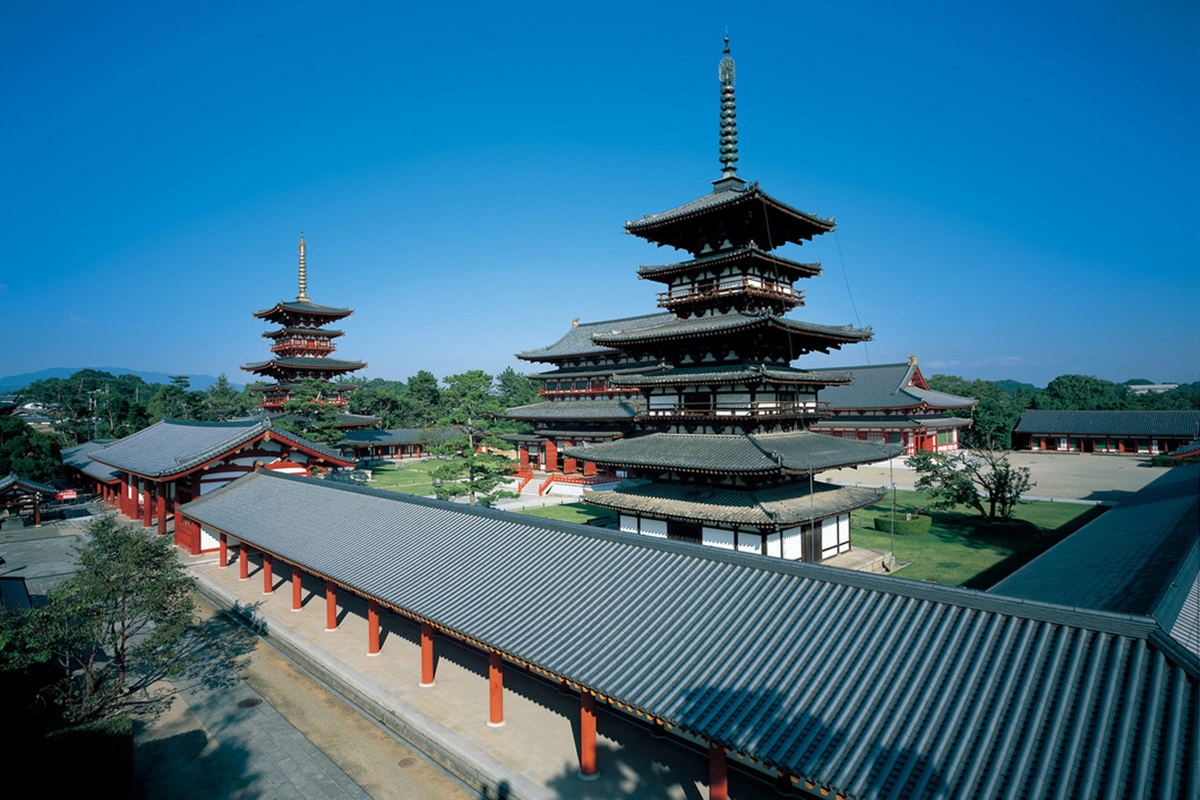Yakushi-ji: A Glimpse into Japan’s Architectural Time Capsule
Nara, Japan, a city steeped in history and tradition, is home to Yakushi-ji, a Buddhist temple that transcends time. Nestled among the serene landscapes of Nara, Yakushi-ji is a testament to the enduring legacy of Japanese architecture. This UNESCO World Heritage Site stands as a guardian of ancient wisdom, whispering secrets of the past to those who dare to listen.
Emperor Tenmu, in a poignant gesture of love, founded Yakushi-ji in the 7th century to pray for the well-being of his beloved wife, Empress Jito. What began as a humble sanctuary has grown into a revered shrine, its fate intertwined with the Fujiwara clan’s rise to power.
A central jewel in the crown of Yakushi-ji is the East Pagoda, a venerable sentinel of history. Rising over 30 meters into the heavens, this five-story pagoda is a masterpiece of Japanese wooden craftsmanship, the oldest of its kind still standing in the Land of the Rising Sun. Its façade tells stories of centuries gone by, with intricate carvings and sculptures that breathe life into ancient tales.
Step into the Central Hall, rebuilt with unwavering dedication in the 1970s, and you’ll encounter the serene gaze of the Buddha Yakushi. Believed to possess the power of healing, this majestic statue presides over the temple, radiating an aura of tranquility. As you stand in its presence, you can almost feel the weight of centuries of prayers and reverence.
Yakushi-ji’s allure isn’t confined to its Eastern treasures; the West Pagoda is a star in its own right. Another five-story marvel, it was constructed in the 8th century, slightly smaller than its eastern counterpart, yet equally adorned with the enchanting carvings and sculptures that define Japanese Buddhist architecture. Together, these twin pagodas stand as a testament to a society’s spiritual devotion.
But Yakushi-ji’s story isn’t one of unbroken serenity. Through the ages, it faced fires, quakes, and the ravages of war. Yet, with indomitable spirit, the temple has risen from the ashes, rebuilt or restored, retaining the essence of its original design. It’s as if the very earth beneath it cradles its history and refuses to let it be erased.
As you explore the temple grounds, you can’t help but feel a sense of reverence and wonder. The tranquil surroundings and the echo of prayers from centuries past create an atmosphere of serenity that envelops you. Yakushi-ji’s architecture, with its intricate details, reflects a profound spirituality, a connection to something beyond the realm of the everyday.
Amidst the temporal beauty, the passing of seasons transforms the landscape. Cherry blossoms adorn the temple in spring, offering a breathtaking spectacle of nature and man-made beauty harmoniously entwined. In autumn, the temple grounds are bathed in a warm tapestry of red and gold, a scene that embodies the very essence of Japanese aesthetics.
The city of Nara, Japan’s first permanent capital, lends its own charm to the experience. As you explore the ancient city, with its serene parks and friendly deer that roam the streets, you’ll feel like you’ve stepped into a time machine. The tranquility of Nara Park, with the towering pagodas of Yakushi-ji in the background, transports you to a Japan of days gone by.
Visiting Yakushi-ji isn’t just about witnessing history; it’s about immersing yourself in it. Each step you take on the temple grounds is a step through time, a chance to connect with Japan’s rich cultural heritage. The stone pathways whisper tales of emperors and empresses, monks and artisans, who, through their collective effort, created this living testament to human ingenuity.
Yakushi-ji is a testament to the enduring power of human creativity, a reminder that the echoes of the past continue to reverberate through the ages. It’s an architectural time capsule, a treasure trove of history waiting to be explored, and an experience that will leave an indelible mark on your soul. In Nara, Japan, Yakushi-ji isn’t just a temple; it’s a portal to a bygone era, a bridge between the past and the present, a place where history comes alive.
